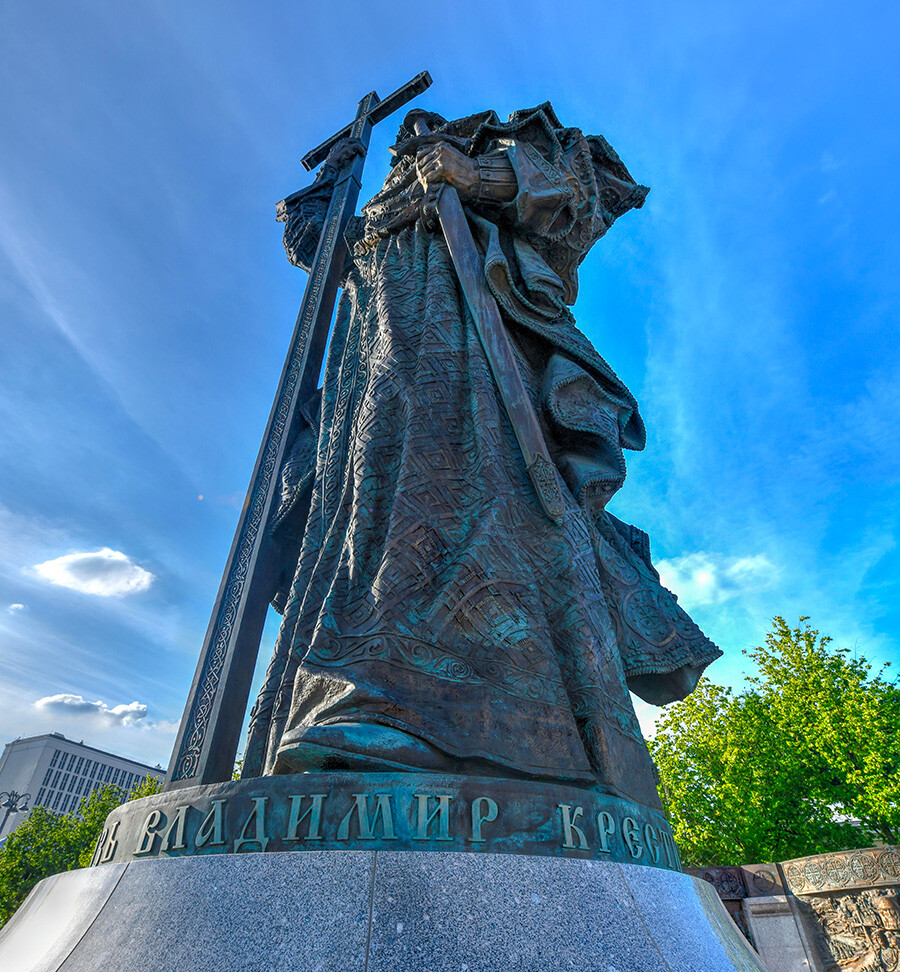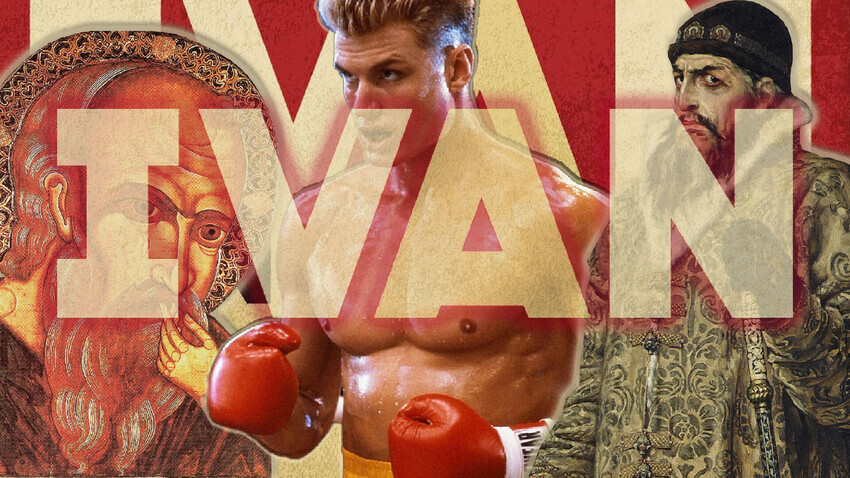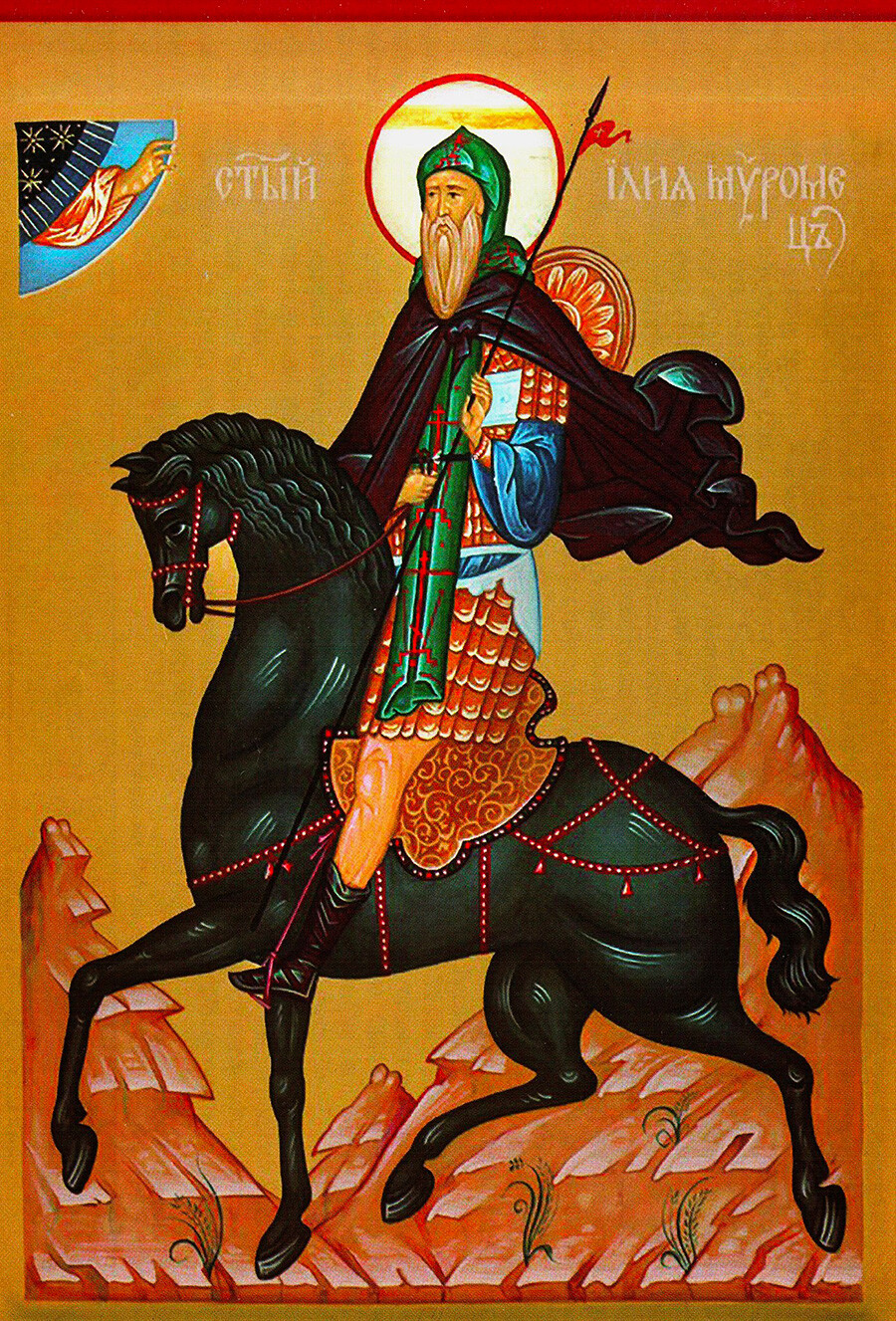
The entire panoply of modern Russian names can be divided into two large groups.
1. The first group comprises names conventionally classified as "indigenous":
- native Slavic names (Vladimir, Vsevolod, Vadim, Dobrynya and Svyatoslav, along with the other "-slavs"), which became widespread among the Slavic peoples;
- Scandinavian names that were adopted courtesy of the Rurik dynasty of Ancient Russia (Gleb, Olga, Igor, Oleg);
- as well as names that appeared during the Soviet era (Vladlen, Kim, Marlen, Arlena, Oktyabrina, Iskra, Elem).
2. Meanwhile, the second group is composed of names that have Jewish, Greek and Roman roots. Less frequently, Russian names originated from Asian languages – Turkic, Persian and Arabic (Darya comes from Ancient Persian, Ruslan from the Turkic "Aslan" that means "lion").

Monument to Vladimir the Great who baptized Russia
Legion MediaMost of the names in the second group came to Russia along with Christianity. They were recorded in the svyatsy – the official Orthodox Church calendar commemorating Christian saints on particular dates.
Before the 1917 Revolution, the Orthodox Church calendar was the main source of names because giving a newborn a name was conducted in accordance with religious tradition. Saints canonized before the Great Schism "supplied" the core of those foreign names.
After the Revolution, when the tradition of following the Church calendar was no longer adhered to, Russia borrowed several names directly from Western Europe (Albert and Robert from German; Anzhela and Dzhon from Angela and John in English; and Zhores from Jaurès in French).
If Aleksandr, Artur, Viktor, Mark, Nikolai, Pyotr, Anna, Maria, Elizaveta or Natalya and their equivalents in different countries all sound very similar, that’s because other ancient names are often changed depending on the traditions of various nations.
Ivan is the Russian equivalent of John, Ian or Sean in English, Juan in Spanish, Giovanni in Italian, Jovan in Serbian, Johann or Hans in German, Jan in Polish and János in Hungarian. The diminutive of Ivan variant is Vanya. The origins of this name go back to the Hebrew Yohanan, and today it’s so ingrained in Russian culture that it’s used as a generic term for a Russian man.

The Russian name Yevgeny, or Zhenya for short, is Eugene in English, Eugenio in Spanish and Italian, Eugène in French and Eugen in German. The Russian version of the name, which is of Greek origin, was immortalized in world culture by Alexander Pushkin in his novel in verse, Yevgeny Onegin.
Next, the Russian name Mikhail, or Misha for short, is Michael in English, Michel in French, Mihály in Hungarian, Miguel in Spanish and Portuguese, Michele in Italian, Michaël in German, Mikael (or Mika) in Finnish, and Mihajlo in Serbian. In 2008, the name Mikhail was the seventh most popular boy's name in Russia, while Michael came in second place in the U.S.
The Russian name Stepan, or Styopa for short, is Stephen/Steven in English, Stefan in Bulgarian, István in Hungarian, Esteban in Spanish, Stefano in Italian, Étienne or Stève/Steeve in French, Stefan in both German and Serbian, and Stjepan (or Stipe) in Croatian. A character in Leo Tolstoy's Anna Karenina, Stepan Oblonsky, styled himself in the English manner as Stiva.
The Russian name Yakov, or Yasha for short, is James or Jacob in English, Séamus in Irish, Jákob in Hungarian, Santiago, Jaime or Diego in Spanish, Giacomo in Italian, Jacques or Jacob in French, Jakob in German, Jacó in Portuguese. The name is derived from the Biblical persona, Jacob. In the Russian tradition, James I of England is known as "Yakov". But James Bond ("Dzheims Bond") never underwent such "customization" in Russian.
The Russian name Georgy, or Gosha for short, is George in English, György in Hungarian, Giorgio in Italian, Jorge in Spanish, Jürgen in German, Jerzy in Polish, Djordje, Djura or Djurdje in Serbian, Jurij in Slovene, Juraj in Croatian and Gjorgji in Macedonian. In Russian, there are another two forms derived from this name, also of Greek origin - Yury and Yegor.
The Russian name Fyodor, or Fedya for short, is Theodore in English, Todor in Bulgarian and Serbian, Teodoro in Spanish and Théo in French . In pre-Revolutionary Russia this name of Greek origin had the form Feodor and was one of the most popular names: There were numerous days in the calendar commemorating saints with this name. The Russian name Bogdan, and also the Bulgarian and Serbian Bozhidar, are close to Fyodor in meaning: They are a calque of the Greek Θεόδωρος meaning "God's gift".
The Russian name Semyon is Simon in English, Simeon in Bulgarian and Serbian, Jimeno in Spanish, and Simon in French and German. When someone has made an obvious blunder or has done something silly, people in Russia address them with the phrase "Oh, Semyon Semyonovich!", employing an expression from the popular Soviet film "The Diamond Arm".

Saint Ilya Muromets, the 19th century icon
Public domainThe Russian name Ilya is Elijah in English, Élie in French, Elías in Spanish, and Elias in Swedish and German. Some Russian researchers believe that the prototype of the most famous Ilya - Ilya Muromets (i.e. Ilya from the city of Murom), a hero of the Old Russian epic poems known as bylinas - was the Venerable Ilya Pechersky who lived in the 12th century. He is regarded as the patron saint of Russia’s border guards, as well as rocket and missile troops.
The Russian name Pavel, or Pasha for short, is Paul in English, Paul in German, Pablo in Spanish, Paolo in Italian and Paul in French. Polina can be regarded as the female counterpart of the name, which is of Latin origin - it is an adapted form of the French Pauline/Paulina, formed from the masculine form Paul.
Dear readers,
Our website and social media accounts are under threat of being restricted or banned, due to the current circumstances. So, to keep up with our latest content, simply do the following:
If using any of Russia Beyond's content, partly or in full, always provide an active hyperlink to the original material.
Subscribe
to our newsletter!
Get the week's best stories straight to your inbox